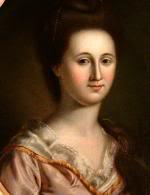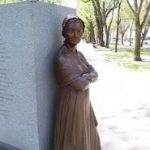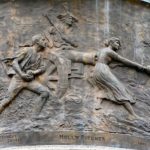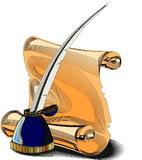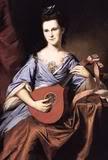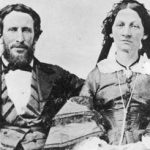Great American Heroine
Esther De Berdt was born October 22, 1746, in London, England, one of two children of Martha Symon De Berdt and Dennis De Berdt, an English businessman who traded with the colonists in Delaware and Massachusetts. The fair-haired, attractive young Esther was a lively talker and a lover of books. The De Berdt children grew up near the Houses of Parliament, in Artillery Court, with summers spent in Enfield.
Arriving in Philadelphia from London as a young bride, Esther De Berdt Reed had by 1774 become a zealous American Patriot. The Ladies Association she founded made shirts for the soldiers of the Continental Army, and became for the model for similar drives in Maryland, New Jersey and Virginia.
Joseph Reed was born August 27, 1741, in Trenton, New Jersey, but his family moved to Philadelphia, Pennsylvania, shortly after his birth. He received his bachelor’s degree from Princeton University and soon after began to study law under Richard Stockton.
In 1763, Esther, aged seventeen, met Reed when he came to London to continue his study of law and they fell in love. Dennis De Berdt, though very fond of Reed, refused to consent for Esther to marry, knowing of Reed’s intention to return to Philadelphia. After completing his studies. Reed returned to America, with only a tenuous engagement to Esther, and they were separated for five years, but kept in touch through correspondence.
In 1769, the lovers were re-united when Reed returned on an uncertain visit to England, where everything but Esther’s faithful affection changed. Political disturbance had interrupted commercial trade; and Mr. De Berdt had died and left his family with serious financial problems. Reed remained long enough to help in settling Mr. De Berdt’s affairs.
Esther De Berdt married Joseph Reed on May 31, 1770, at Saint Luke’s Church in London. To help Esther’s mother escape the public shame of bankruptcy, the young couple brought her with them to Philadelphia the following October.
Although Esther was initially hesitant about the more provincial culture of colonial America, she gradually embraced the patriot cause. She was dismayed by her native country’s treatment of its American colonists and in favor of a move towards independence, however frightful that change might be.
On November 2, 1774, in a letter to her brother Dennis in London about family matters, but nostalgia gave way to patriotism when the wrote about the strained relationship between her homeland and her adopted country.
I have two of my dear Dennis’ letters by me unanswered, one of which is of a very early date, and ought to have been acknowledged long ago. But when I tell you I have another daughter, you will not wonder that I have this time been a little negligent in answering letters. I assure you my hands are pretty full of business. Three children seem to take up all my time and attention, but, amidst these surrounding family concerns, my dear brother keeps his place in my affectionate regards with undiminished warmth; but what need of assurances.
In the same letter, Esther dismissed any false hopes of reconciliation between England and the colonies:
The people of New England have not such expectations. They are prepared for the worst event, and they have such ideas of their injured liberty, and so much enthusiasm in the cause, that I do not think that any power on earth could take it from them but with their lives.
Philadelphia was then the heart of the nation, and the city reacted generously and boldly when the news of the Battles of Lexington and Concord startled the whole land in April 1775. Volunteer troops were raised – money in large sums was remitted, much through Mr. Reed’s direct agency, for the relief of the sufferers in New England.
Joseph Reed was elected as a member of the First Continental Congress, a meeting of representatives of the American colonies that met in Philadelphia in the fall of 1774 to decide what to do about America’s ongoing problems with England. During the congress the Reeds entertained its representatives, including George Washington, John Adams, and Silas Deane.
On July 22, 1775, Esther wrote to her brother:
The whole continent is so engaged now that they never will give up. Georgia has joined the Congress, – every heart and every hand almost, is warm and active in the cause: certainly, my dear brother, it is a glorious one. You see every person willing to sacrifice his private interest in this glorious contest. Virtue, honor, unanimity, bravery, – all conspire to carry it on, and sure it has at least a chance to be victorious. I believe it will, at last, whatever difficulties and discouragements it may meet with at first.
The Revolutionary War
In 1775 Joseph Reed, left his successful Philadelphia law practice, and at the general’s request, joined General George Washington. From New York Reed wrote to Esther that he had become a member of the general’s staff as an aide and military secretary with the rank of colonel. Esther knew that he was responding to a high sense of duty, and that hers it was “to love and be silent.”
In 1776 when he was appointed Adjutant General of the American army, he rejoined the army at New York. In 1777, Reed was offered the positions of Brigadier General and Chief Justice of the Supreme Court of Pennsylvania – both of which he declined. Though he took part in many military engagements in the northern and eastern sections of the war, he was never wounded.
The Reeds had six children: Martha, Joseph, Esther, Theodosia (who died as an infant of smallpox), Dennis De Berdt, and George Washington Reed. Esther stayed in Philadelphia raising their young children from July 1775 to January 1777, while her husband served as George Washington’s aide and adjutant general of the army.
Esther to Joseph Reed, June 1777:
I have received both my friend’s letters. They have contributed to raise my spirits, which, though low enough, are better than when you parted with me. The reflection how much I pain you by my want of resolution and the double distress I occasion you, when I ought to make your duty as light as possible, would tend to depress my spirits, did I not consider that the best and only amends is, to endeavor to resume my cheerfulness, and regain my usual spirits. I wish you to know, my dearest friend, that I have done this as much as possible, and beg you to free your mind from every care on this head.
On several occasions during the war, Esther and her children were forced to flee Philadelphia, and she had an escape plan ready. In July 1777, the English generals resolved on a new and more elaborate attempt to capture Philadelphia. On the landing of the British army, and during the military movements that followed, Esther was at Norristown, Pennsylvania.
During the military operations of the autumn of 1777, Reed was again attached as a volunteer to Washington’s staff, and during the winter that followed – the worst that America’s soldiers saw – he was at Valley Forge, as one of a committee of Congress, while serving his second term there.
In September 1777, as the British got closer to Philadelphia (and eventually occupied the town), Esther took her little family to Burlington, New Jersey; and in the winter on the approach of the British invading forces, took deeper refuge at a little farmhouse near Evesham.
Esther’s letters show her agonized condition at the continual risk her husband was running. In February 1778 she wrote to a female friend:
This season which used to be so long and tedious, has, to me, been swift, and no sooner come than nearly gone. Not from the pleasures it has brought, but the fears of what is to come; and, indeed, on many accounts, winter has become the only season of peace and safety.
Returning spring will, I fear, bring a return of bloodshed and destruction to our country. That it must do so to this part of it, seems unavoidable; and how much of the distress we may feel before we are able to move from it, I am unable to say. I sometimes fear a great deal.
It has already become too dangerous for Mr. Reed to be at home more than one day at a time, and that seldom and uncertain. Indeed, I am easiest when he is from home, as his being here brings danger with it. There are so many disaffected to the cause of their country, that they lie in wait for those who are active; but I trust that the same kind presiding Power which has preserved him from the hands of his enemies, will still do it.
Esther, with her mother and children, took refuge at Flemington, New Jersey, where they remained until after the evacuation of Philadelphia and the Battle of Monmouth in June 1778. While they were there, baby Theodosia Reed died of smallpox. The troubled times and separation from home and husband affected Esther greatly.
In the fall of 1778, Joseph Reed was elected President (Governor) of Pennsylvania, and the Reed family once again settled in Philadelphia. He held that position from December 1778 until 1781, and Esther was known as Mrs. President.
Philadelphia was still divided between those supporting the new government and those loyal to the old. In October 1779, local Loyalists rioted and threatened anyone associated with the leadership of the new government. Esther once again moved her family to Flemington, New Jersey. Perhaps because she was British, Esther’s life there was made miserable by British soldiers and roving bands of Loyalists (American colonists who remained loyal to England).
Ladies Association of Philadelphia
By 1780, the fifth year of the Revolutionary War, the soldiers of General Washington’s army were living under horrible conditions. In late May 1780, Washington reported to Congress that serious and prolonged shortages of rations and clothing, and lack of pay had nearly exhausted his troops. Immediate relief was needed.
At the same time, Esther De Berdt Reed, first lady of Pennsylvania, was suffering from smallpox. Upon her recovery, she came up with an idea to help the suffering Continental soldiers. Reed began the Ladies Association of Philadelphia to raise funds for the Continental army.
Esther cleverly made sure that the wives of influential men were asked to be part of the effort. These included Benjamin Franklin’s daughter, Sarah Franklin Bache. Since the organization’s leaders included the best ladies of the patriot cause, publicity also became instrumental in spreading the word.
Because it was uncommon for women of that time to assert themselves in such situations, Reed was very careful as to how she went about the campaign. On June 10, 1780, she published a broadside – Sentiments of an American Woman – explaining why women should help the army, and stressing that women were the equals of men in patriotism.
In mid-June, the broadside was distributed door to door by a group of thirty-nine women as they went about door to door contacting every household in Philadelphia. The women, disregarding prevailing rules of polite behavior, asked for money from all classes of people.
The efforts were so successful that in her July 4, 1780, letter to Washington, Esther Reed could report that the women had raised more than $300,000 continental dollars. When converted to specie (precious-metal coin), it amounted to approximately $7500, a large amount for the times.
Washington responded to Esther on July 14, 1780:
If I am happy in having the concurrence of the Ladies, I would propose the purchasing of course Linnen, to be made into Shirts, with the whole amount of their subscription. A Shirt extraordinary to the Soldier will be of more service, and do more to preserve his health than any other thing that could be procured him. This appears to me, to be the best mode for its application, and provided it is approved of by the Ladies.
Esther believed that the government should pay for the soldiers’ food and supplies and she believed the money should go directly to the soldiers. After several more letters between the two, the general urged her to reconsider because the army was in strict need of shirts.
After receiving this letter, Esther used the funds to purchase linen, and the Ladies began sewing shirts for the soldiers. To personalize the gift, she had each volunteer seamstress sew her name into the clothing she made. But the woman who had envisioned and structured the organization would not see its completion.
All this time, this was a delicate woman was suffering with anxieties over her husband, who was again with the army, and family cares daily multiplying. Her body and heroic spirit were already overtasked, and in the early part of September, she was stricken with acute dysentery – an epidemic that spread quickly through Philadelphia.
Esther Reed died on September 18, 1780 – a month before her 34th birthday – with her aged mother, her husband and little children, the oldest ten years old, mourning around her. She is buried in the Arch Street Presbyterian Church Cemetery in Philadelphia.
All of Philadelphia mourned her early death and a moving obituary was written praising her patriotism, and stating that her death might have occurred because she had “imposed on herself too great a part of the task” of the Ladies Association.
It also mentioned a quality soon to be attributed to women on a far grander scale: virtue. What is key to the symbol of virtue with women is its significance to their domestic sphere within the home. The war did not lead women such as Esther Reed to question the traditional role of women, but added another dimension to it. Thus, the new rhetoric of Republican Motherhood came into being and virtue threaded its way into the very fabric of its meaning.
Sarah Franklin Bache stepped into Esther’s position and led the Ladies in finishing the project Esther had begun. More than 2000 shirts were delivered to the Continental Army in late December, just in time for Christmas.
After Esther’s death, Joseph Reed continued to serve his third and final term as President of Pennsylvania, which ended November 15, 1781. His time in that office occurred when America’s fortunes went from near desolation at Valley Forge to victory at Yorktown on October 19, 1781.
Such positive reversal of fortune was not a coincidence. Working with James Madison in the Continental Congress, Reed helped pass a bill that allowed General Anthony Wayne to gather the resources in Pennsylvania that were necessary for his army to march to Yorktown to help seal the fate of the British Army under General Charles Cornwallis.
In 1784, Joseph Reed visited England for the sake of his health, but he died there on March 5, 1785, in his forty-third year.
In 1853, Esther’s grandson William Bradford Reed published her biography, The Life of Esther De Berdt, Afterwards Esther Reed of Pennsylvania.
Esther Reed’s patriotism is particularly noteworthy. She had come to America only a decade earlier. The war had effectively separated her from her family and friends in England. Furthermore, she undertook leadership of the women’s relief efforts in the weeks immediately following the birth of her sixth child, George Washington Reed, at a time when most women would have restricted their activities severely.
By creating the Ladies Association, a public place for women to congregate within the accepted boundaries imposed by eighteenth-century standards, Esther made a significant contribution to the war effort. Her involvement in public affairs and her often-criticized efforts to include women in patriotic activities broadened the role of women in the new country and established a political agency that would impact future generations of women.
SOURCES
Esther De Berdt Reed
Wikipedia: Joseph Reed
Wikipedia: Esther De Berdt
Sentiments of an American Woman
The Sentiments of an American Woman
Esther De Berdt Reed in The American Revolution
National Women’s History Museum: Esther DeBerdt Reed
